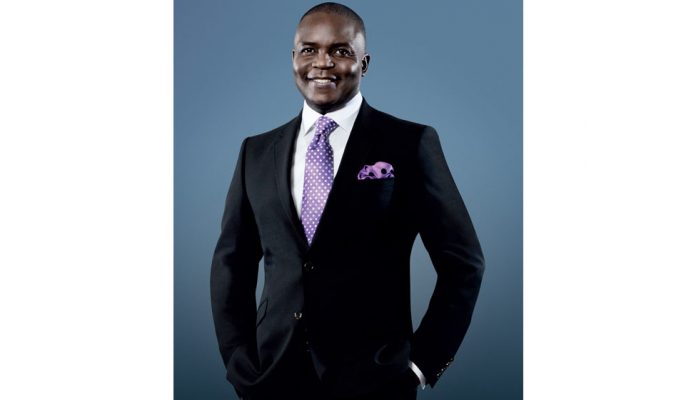For the past ten years, Brand Africa has worked to mobilize Africans and the diaspora to proactively conduct an African brand-focused program. Its founder and president, Thebe Ikalafeng, tells us how Africa can build better brands.
When you look at African brands today, would you say they are stronger than they were ten years ago?
As was the case at the turn of the decade, there remains a stronger enthusiasm for building African brands. But the rhetoric does not correspond to reality. There is not as much progress in the story of the creation of big brands.
Some of the most loyal brands have consolidated their strengths, be it MTN, Safaricom, Dangote. Their brands remain a staple across the continent. But these examples are in the minority: we must see many more brands appear.
Over the past decade, we have seen a greater presence of African talent in the world, be it in fashion, music, the arts. Does this not mean a stronger “Africa of brands”?
Africa has never lacked talent and the world has never stopped looking to Africa for inspiration! What we have not seen emerge, and which are prominent today, are the global African brands, even as “essential” as Zara and H&M or luxury as Hermes and Goyard.
Where Zara and H&M and others lead, it’s not just fast fashion, but agile thinking to adopt or adapt to consumer trends and ideas.
There are many examples of African talent. We can cite the young South African designer Thebe Magugu, the first South African to win the prestigious LVMH fashion design award.
The African ready-to-wear retailer, KISUA, founded by the Ghanaian Sam Mensah to challenge Zara and H&M. Alara, the high-end Nigerian retailer founded by Nigerian businesswoman Reni Folawiyo. We have a lot of talent, we have a lot of enthusiasm and drive, but unfortunately we don’t see enough resources, patience and sponsorship that will support their growth.
Do you mean we need to invest more in branding or do we have to think about brands differently, in terms of what a brand represents, and making it go global?
There are two parts. In general, millennials are less forgiving and less loyal to brands than the less young. They will move on to the next brand if it does not keep its promise. Not only on what it does functionally, but on how it integrates into society, how it sees itself, what it does for the environment.
In Africa, we are too forgiving and have often returned to brands, even those that have been less than kind or respectful to us – often for lack of alternatives.
Two decades ago, when I was marketing director of Nike for the continent, during my first trip to Cannes in France, for the biggest advertising gathering in the world, I was amazed to see that many brands of England were inspired and took advantage of their English heritage. The French sold France. At the same time, African brands were trying to be American, British or French!
It was a wake up call for me. African brands cannot and should not compete with the French on the French way of being! They have neither authority nor authenticity.
We need to share a distinctive African story with the world. This is what at Brand Leadership we call “think locally and act globally”. In other words, we must be inspired by our African identity and heritage, but respect a global standard.
Where do you think Africa will break through? In fashion, the arts, music, culture or in technology, innovation, banking, logistics?
The biggest opportunities for African brands are in technology and the arts. See EVC in Somalia, Wari in Senegal and at the head of the peloton, M-Pesa: technology has allowed us to overtake many western countries, struggling with “brick and mortar” problems.
Mobile money is where Africa has probably shown its greatest leadership. The brands are referenced. Rwanda and Kenya are accelerating their initiatives to build world-class technology cities to leverage technology to boost development, not only for Africa but for the world.
When it comes to arts and culture, we’ve always been there with a global influence from Miriam Makeba from South Africa, collaborating with Harry Belafonte in the 1960s, or the most successful Broadway production, The Lion King or Mantsho.
Without forgetting the South African designers collaborating with H&M for their first world range of African inspiration. Luxury fashion brands are constantly looking for inspiration in Africa.
The problem is not our talent, it is the property of our creative production. We are often invited rather than owning space and dictating our own terms. So Stella McCartney can charge $1,000 for an item we sell for $5 or Louis Vuitton can openly refer to a Lesotho cover and we will be the first to pay the 3,000% premium!
We can take back our space: already, we benefit from an appreciation of the “African” aesthetic or rather, from an appreciation of the aesthetic of design which makes Africa different and admired.
We have a Ghanaian and a Kenyan at the head of British Vogue and another Ghanaian at LVMH, so we see these talents in high places. However, African fashion remains a very small component of global fashion.
Unfortunately, while we have taken on these world positions which, in theory, are influential, the biggest transformations we have seen are the faces on the covers and the names behind the titles.
This trend you describe has not yet translated into African-inspired creativity, African supply and African wealth. While Virgil Abloh has brought Louis Vuitton the credibility of the street inspired by hip-hop and rap culture, he has not yet brought a convincing African narrative. Let’s say it’s a good start!
One thing that came out of the survey: Africa benefits from the technology brands we consume daily, Google and Facebook, and yet they are not as important as our traditional brands. Why?
People’s relationship with brands is quite informative. Some brands are part of a person’s identity and affiliation and others a necessary evil, so to speak.
Generally, media and financial brands are not seen as an “identity badge” but a necessary evil. They are considered essential products rather than “brands” that reflect their status or position. It’s the difference.
Finally, at the moment, we are going through a crisis, a health crisis and an economic crisis. People say that crises build a reputation. How to build brands in times of crisis?
As shown by our initiative of the best African brands, we have mainly relied on non-African brands for luxury but mainly on African brands.
During this crisis, where non-African luxury brands and others were paused, we relied more and more on essential brands, mainly African, for our daily lives.
Coming out of this crisis, essential brands that have shown empathy, urgency and necessity will be rewarded. Time spent off the world stage due to the pandemic has created an opportunity to deepen the engagement of local brands with African consumers in times of need beyond their functional needs alone and has laid a foundation and an opportunity once again for African brands to grow.
Reference: https://placebrandobserver.com/thebe-ikalafeng-interview/

